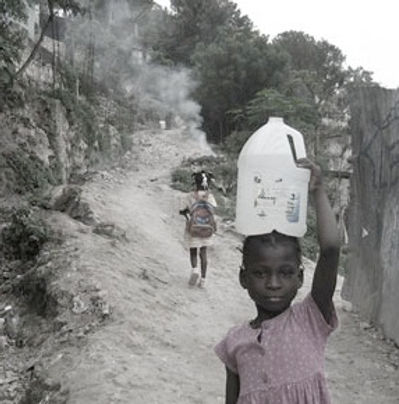The Enslaved
Restavek. Haitian Creole term that means Rester: to stay. Avek: with.
Translates to child slave or domestic servant. Restaveks are Haitian children, usually females between the ages of 4 and 15. They are usually owned by another Haitian family. These child slaves do all of the household chores, such as caring for other children, cooking, cleaning, washing, and fetching water. They often labor for 14 hours a day. Unfortunately, they are most often severely physically abused, sexually abused, starved, and not allowed to go to school.
They have no place. No voice. No value.

Photo from The Woman's Torch
Restavek
Restavek


Haiti's 'Restaveks' - another word for child slavery?

Poverty in Haiti spawns child slavery 13 October 2008

The Restavek Foundation CNN
"In Haiti, a majority of trafficking cases are comprised of approximately 500,000 restavek children living in domestic servitude throughout the nation. The U.S. Department of State has confirmed a definite increase in the number of restavek children trafficked to the Dominican Republic. It is estimated that roughly 2,500 children are trafficked annually from Haiti to the Dominican Republic."
- Borgen Magazine 2019

How can RAIZ help?
In so many situations, abandoned or orphaned children are physically and sexually abused. The Dominican Republic has programs and social workers to help in these situations, but, as many countries often do, they have a lack of reliable and healthy foster/safe homes in order to remove these children out of horrific situations.
We hope to become a trusted resource for housing and rehabilitating trafficked, abandoned, or abused children, of any race, in the Dominican Republic.
Photo from A Child's Hope Int.
What are the steps?
1. Register
At Raíz, we want to conduct ourselves with honesty and integrity in all that we do. Because of this, our first step is to register our organization with the Dominican Republic government. This will allow us to legally provide a safe house for trafficked, abused, and abandoned children. This process is difficult and will take minimum of a year to complete, but we believe in the importance of this accountability.
2. Build
We are currently looking to buy secure land in the Dominican Republic and start the process of building our safe house. We want to provide a comfortable place of love and joy, not a cold institution. Because of this goal, we are looking for enough land to build small homes that can each house six to eight children and 2 adults.
3. Deliver
Partnering with a local agency, our vision is to rescue children from the worst cases of domestic slavery in the Dominican Republic. We will provide a loving and safe home, trauma counseling, medical care, education, and a family environment. These children will stay in our care as they recover and are fully capable to transition to a partnering orphanage or boarding school.
4. Defend
Child domestic slavery is a common and accepted practice. We believe that change begins with awareness and education. This is a long process that requires an intimate understanding of their cultural practices and long-term relationships based on love and respect. Raíz Outreach Team will use these principles to begin instilling the idea of the absolute value of life within the churches and communities of this nation.

What are we doing now?
Rescuing these children is our ultimate long-term goal. Until we can safely and legally take in children, we are constantly working to further our cause in other ways. Our current projects include:
-
Registering Raíz with the Dominican Government.
-
Searching for affordable land.
-
Making relationships and building trust with the surrounding communities and other non-profit organizations.
-
Helping equip and empower impoverished communities through our Village Projects.
-
Coming alongside community leaders to help and encourage them in their mission to raise their communities from the cycle of poverty.